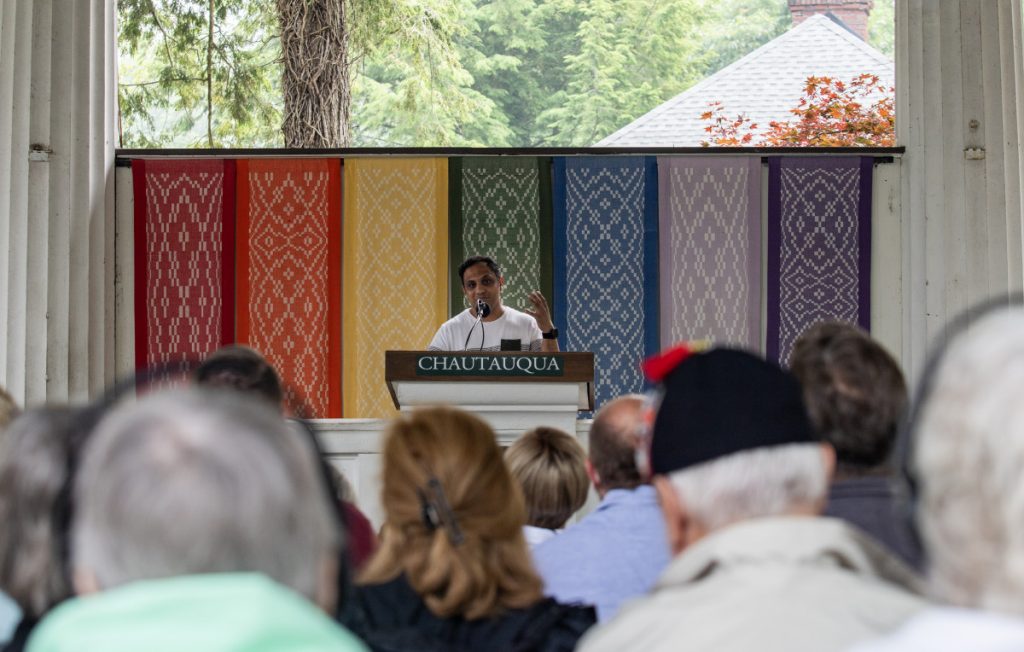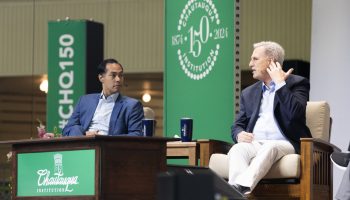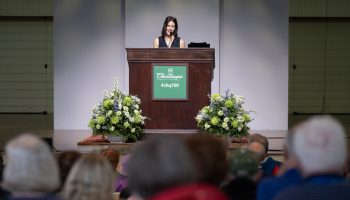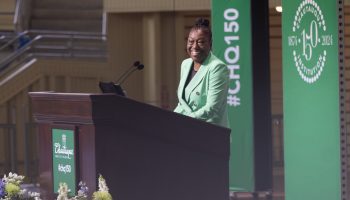
Kaitlyn Finchler
Staff writer
Friendship looks different for everyone. It can be a long-lasting relationship, or quickly born of the kind acts of strangers. For Yemeni refugee Mohammed Al-Samawi, it’s both. His story of friendship and activism is the defining one of his life.
Al-Samawi, author of The Fox Hunt: A Refugee’s Memoir of Coming to America, delivered his lecture at 2 p.m. Wednesday in the Hall of Philosophy for Week Two of the Interfaith Lecture Series themed, “Holy Friendship: Source of Strength and Challenge.”
To lighten the mood — his story included, after all, death threats, and safety officers lined the perimeter during his talk — Al-Samawi warned the audience he has an accent, and would try to speak slowly while explaining his main points: friendship, the power of interfaith engagement and the power for change.
Due to a disability, he was not able to do most things young boys enjoy, like ride a bike or play football.
“Even though I had a disability, I have amazing parents; both of them are medical doctors,” Al-Samawi said. “Actually, all my siblings and my parents are medical doctors. I’m the only one who is not a doctor in the family.”
His family taught him that, even with the disability, God had a mission for him. Sometimes it isn’t seen right away, but one day it would become clear.
“Because of my disability, I was having a difficult time having friends,” Al-Samawi said. “Other kids my age were making fun of the way I walk (and) the way my hand looks. But I was always trying to show them that even if I have a disability in my body, I don’t have a disability in my mind.”
This is why he learned English, “to show them that I can do things they cannot do.”
As a person who loves love, Al-Samawi said he’s always felt connected to God and could always talk to God — then, “something amazing” happened.
“When I was 23 years old, I met a Christian teacher named Luke,” he said. “Luke was working in Yemen. For me, I had the chance to practice my English, finally, with someone and we were talking a lot and he became a father figure for me.”
Not to be confused with the love for his own father — Al-Samawi said his father is “an amazing human being.” But with Luke, he could talk about girls and other things “that I’m not able to talk with my dad about.”
One day, Luke told Al-Samawi he had to leave Yemen in three months.
“I felt sad that a friend that, finally I know, will go away from me,” he said. “I wanted to get him a gift. A gift, so when he got back to his country (that) he would remember me always.”
He searched for various tangible gifts, ranging from a watch to perfume to a ring. Then, on a Friday in the mosque, the Imam started praying for what Al-Samawi described as “religious extremism” against Christians and Jews.
“The first thing that came to my mind is that ‘Oh my God, Luke is going to be in hell and I need to save his soul,’ ” Al-Samawi said. “So that was my gift for him. I wanted to save his soul from hell … by converting him to Islam.”
But how? He bought Luke a copy of the Quran in English.
“I told him, ‘If you care about our friendship, I want you to read it,’ ” Al-Samawi said. “He’s amazing — he didn’t tell me at that time that he had already read it.”
Luke told Al-Samawi he would take the book on one condition, and he agreed. The condition was Al-Samawi had to read the Bible, and Luke gave it to him hidden in a green plastic bag. Hidden, because if anyone found out Luke had gifted the Bible, or Al-Samawi had received it, they would both be persecuted.
Nonetheless, Al-Samawi brought the Bible home, started reading and was instantly intrigued by Christianity. Through reading the Bible, he came to better understand Luke, as well as the Christian Ethiopians in Yemen.
Al-Samawi decided he wanted to reach out and hear more from both Christians and Jews, so he searched “Israeli” on Facebook.
“The truth is, they have a lot of pretty girls,” he said. “I didn’t know how to use Facebook so I started adding them as friends — as you can imagine, nobody accepted my request.”
He then sent a message along the lines of, “Greetings from Yemen, I know that you’re a Jew. I know that you are from Israel. What do you think of Yemen? What do you think of Muslims? Yours sincerely, Mohammed.”
Looking back, Al-Samawi said he could see how the message would have been seen by those on the receiving end.
“It’s like a Nigerian prince asking for a million dollars,” he said. “But the amazing thing (was) that people responded to my message, and I started having my own (interfaith) journey.”
Through these conversations, Al-Samawi learned more and more about Christianity and Judaism from those he corresponded with. He also traveled to meet these people in different countries and ended up meeting a gay Jewish breakdancer, and a stand-up comedian named Justin Hefter at a conference in Jordan.
After returning to Yemen, he shared his stories with friends and family. His friend’s father accused him of being an agent for Mossad.
“It was a really hard time, because I wasn’t only afraid (for) myself — I was afraid (for) my family,” Al-Samawi said.
He decided he needed to leave his family. He moved to another city, but was trapped by an extremist group raiding his house at the outset of the civil war in Yemen, which is still ongoing.
He hid out in his apartment and prayed while al-Qaeda ramsacked the neighborhood. Al-Samawi’s prayer led him to post on Facebook, asking if anyone could help him.
Daniel Pincus, the previously mentioned breakdancer, reached out and “opened a window of hope for me.” Four people — who had never met, had no connection, nor any military evacuation skills — called in every favor they had to help Al-Samawi get out of Yemen.
Megan Hallahan, a Christian, sent a message out to her friends asking if anyone could help her friend in Yemen escape from his apartment. She didn’t mention Al-Samawi by name, but Hefter knew him and offered Al-Samawi’s help to the man — not realizing he was the man in need of help.
News of Al-Samawi’s situation reached Jewish woman Natasha Westheimer. The four of them reached out to senators, embassies and governments around the world asking them for help.
“A lot of people didn’t even respond to that request,” Al-Samawi said. “But there is one country that responded, which is India. India, at that time, did an evacuation for the Indians who live in Yemen.”
The four individuals reached out to former Illinois Senator Mark Kirk, who had a disability similar to Al-Samawi’s. When Kirk heard his story, he reached out to the Indian government.
Hefter saw a tweet about the evacuation and asked Al-Samawi if he saw a military boat, and told him that was where he needed to go. He found himself among 100 Yemenis trying to get to the vessel, but couldn’t get there without a small fishing boat.
“(The boat owners) were taking advantage of us, of course,” he said, requiring the refugees to give them money, or their phones, “in order for them to let us actually go through to the military ship.”
Someone on the ship called out Al-Samawi’s name over a megaphone, and as he raised his hand, they said they would take all the Yemenis in search of refuge. The Indian government was only expecting one refugee, but took and fed all 100 of them.
Al-Samawi received seven invitations to come to the United States, but he never expected the American embassy to grant him a visa. They did.
Pincus’ friend surprised him by buying Al-Samawi a business class ticket from Djibouti to San Francisco. While grateful, this raised two problems.
One, he had no luggage nor taken a shower. Next, as a Yemeni, he wasn’t permitted a one-way ticket to the United States; it had to be a two-way ticket.
“When I was in Frankfurt, the police stopped me and they said ‘You cannot go to the United States,’ ” Al-Samawi said. “I don’t know what changed their minds, but I think maybe they were afraid that I would apply for asylum in Germany.”
The police changed their minds and said “the Americans gave him the visa, let them handle it,” and he arrived in San Francisco.
“A lot of Americans, I don’t think they realize how much this country is beautiful,” Al-Samawi said. “I wish they knew that we are so lucky to be in this land, having this freedom that we have right now.”
When he came to the United States, he didn’t want to continue his interfaith work. He wanted to work at Starbucks.
“I wanted to start fresh and forget about what happened to me,” Al-Samawi said. “But because I started talking more about my story, my story became popular in a lot of ways.”
A movie offer was the last thing on his mind when he arrived in the United States, but Al-Samawi was approached by producer Marc Platt, wanting to turn his story into a film.
Next came a book deal, with about 12 different offers from various publishers. While he was glad to tell his story, when he watched the events of Jan. 6, 2021, unfold, it gave him flashbacks to Yemen in 2015.
“I decided that I wanted to do something because I love the United States,” Al-Samawi said. “I want to give back a little bit of what freedom I am having here. So, with the help of the four individuals who helped me out, I created an organization called the Abrahamic House.”
The Abrahamic House is a multifaith co-living and co-creating space to learn, share, pray, celebrate, connect and serve. The organization has a fellowship allowing young professionals to stay in the house for free, as long as they are of Muslim, Jewish, Christian or Bahá’i faith.
“They need to live in the house, go to their work (and) go to their universities,” Al-Samawi said. “But every weekend, they need to do events that speak against hate and speak more about the peaceful things in our own religions.”
Through this work, Al-Samawi spends his time advocating for interfaith peace. Now living in Washington D.C., he spent the last month in Jordan reuniting with his family. While not in total support of his work, they want him to be happy. He hopes one day they can join him in the United States.
“I’m still, by the way, not an American,” Al-Samawi said. “I’ve been held in this country for seven years. But, by the end of this year, I will finally be able to apply for the nationality.”
He is still grateful, and said the love of God created people from different nations, times and religions.
“Imagine this: We are in this beautiful land that only has one tree from the same type. You will never appreciate the beautiful things around it,” Al-Samawi said. “But, because we have different trees (and) different types, you can really appreciate the beautiful things about it. And I think that’s what America is for me today.”




